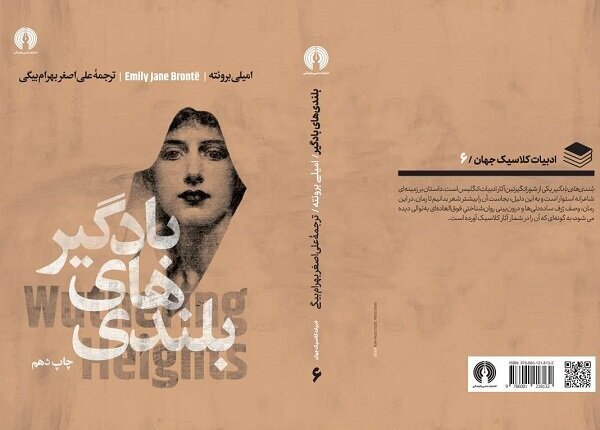Persian edition of “Wuthering Heights” republished
TEHRAN- The 10th edition of the Persian translation of English novelist and poet Emily Brontë’s 1847 novel “Wuthering Heights” has recently been published. Elmi Farhangi Publications in Tehran is the publisher of the book translated by Ali Asghar Bahram Beigi. “Wuthering Heights” follows the lives of the Earnshaw and Linton families in the Yorkshire moors.


TEHRAN- The 10th edition of the Persian translation of English novelist and poet Emily Brontë’s 1847 novel “Wuthering Heights” has recently been published.
Elmi Farhangi Publications in Tehran is the publisher of the book translated by Ali Asghar Bahram Beigi.
“Wuthering Heights” follows the lives of the Earnshaw and Linton families in the Yorkshire moors. The story begins in 1801 when Mr. Lockwood, the new tenant at Thrushcross Grange, visits his landlord, Heathcliff, at the isolated Wuthering Heights. Upon arrival, Lockwood encounters a cold atmosphere filled with hostility from the servants. Snowed in for the night, he reads the diary of Catherine Earnshaw, leading to a disturbing nightmare that foreshadows the haunting themes of the novel.
Lockwood becomes bedridden due to illness, prompting Nelly Dean, the housekeeper, to recount the tragic history of the Earnshaws and Heathcliff. She recounts how Mr. Earnshaw adopted Heathcliff, an orphan with mysterious origins, as a favorite. This favoritism leads to resentment from Earnshaw’s biological children, particularly Hindley, who abuses Heathcliff after their father’s death. Heathcliff and Catherine form a close bond, but societal pressures and Hindley’s cruelty push Heathcliff away.
Catherine eventually marries Edgar Linton, believing that it is socially advantageous, despite her deep love for Heathcliff. This betrayal devastates Heathcliff, who returns years later, now wealthy and determined to exact revenge. His machinations lead to further suffering for those around him, including manipulating Hindley and pushing Edgar’s sister, Isabella, into a disastrous marriage with him. As Heathcliff’s obsession for Catherine continues, her health deteriorates, and she dies after giving birth to a daughter named Cathy.
Years later, Heathcliff seeks to unite his son Linton with Cathy to secure his claim on Thrushcross Grange. However, Heathcliff’s violent passion for Catherine ultimately consumes him, leading to his demise. The novel concludes with Cathy and Hareton, Hindley’s son, finding solace together as they plan a future amidst the tragic legacies of their families. The story ends on a ghostly note, suggesting that Catherine and Heathcliff, eternally intertwined in love and suffering, may finally be at peace.
“Wuthering Heights,” the sole novel by Emily Brontë, was published in 1847 under the pseudonym Ellis Bell. A classic of English literature, influenced by Romanticism and Gothic fiction, it was accepted by publisher Thomas Newby alongside Anne Brontë’s “Agnes Grey.” Posthumously, Charlotte Brontë edited a second edition in 1850. Initially controversial for its portrayal of cruelty and challenges to Victorian values, it is now deemed one of the greatest English novels, inspiring numerous adaptations.
Emily Jane Brontë (1818 – 1848) was an English novelist and poet, best known for her only novel, “Wuthering Heights”. She also published poetry with her sisters Charlotte and Anne in “Poems by Currer, Ellis, and Acton Bell.” Emily, the second-youngest of the Brontë siblings, adopted the pen name Ellis Bell. She taught briefly at Law Hill School but struggled with the demanding work schedule, returning home to assist with household duties.
In 1842, she and Charlotte attended a girls’ academy in Brussels to improve their languages. Emily felt out of place, resisting Belgian customs but impressing her teachers with her strong character. In 1844, she began organizing her poetry, with notable works emerging during this time. The sisters published their poetry in 1846 under their pseudonyms, despite initial low sales. Critically, Emily’s poems were recognized for their depth and musicality, indicating her literary talent.
SAB/
